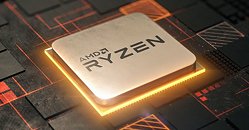Wednesday, May 2nd 2018

AMD to Begin Sampling 7nm "Zen 2" Processors Within 2018 for a 2019 Launch
It looks like AMD's processor product launch cycle is on steroids, and keeping up (or even ahead) of Intel. After launching the first 12 nm processor architecture with "Zen+," the company is giving final touches to what it hopes to be the world's first 7 nanometer processor architecture, with "Zen 2." The company will reportedly begin sampling the chip within 2018, to enable volume production and market launch in 2019. Speaking at an investors conference call following the company's Q1-2018 Results release, AMD CEO Dr. Lisa Su confirmed the 7 nm roll-out strategy of her company.
"We have a 7nm GPU based on Vega that we'll sample later this year. We have a 7nm server CPU that we'll sample later this year. And then, obviously, we have a number of products that are planned for 2019 as well. So it's a very, very busy product season for us. But we're pleased with the sort of the execution on the product roadmap," Dr. Su said. Unlike Zen+, Zen 2 is a major update to the company's processor micro-architecture, and presents the company with opportunities to improve several silicon-level specifications, such as the number of cores per CCX, the IPC of each core, the core-count of the die, the cache hierarchy, and the overall energy-efficiency.
Source:
Seeking Alpha
"We have a 7nm GPU based on Vega that we'll sample later this year. We have a 7nm server CPU that we'll sample later this year. And then, obviously, we have a number of products that are planned for 2019 as well. So it's a very, very busy product season for us. But we're pleased with the sort of the execution on the product roadmap," Dr. Su said. Unlike Zen+, Zen 2 is a major update to the company's processor micro-architecture, and presents the company with opportunities to improve several silicon-level specifications, such as the number of cores per CCX, the IPC of each core, the core-count of the die, the cache hierarchy, and the overall energy-efficiency.

101 Comments on AMD to Begin Sampling 7nm "Zen 2" Processors Within 2018 for a 2019 Launch
1. Ice Lake has tapped out almost a year ago (hexus.net/tech/news/cpu/106864-intel-says-10nm-cannon-lake-track-ice-lake-taped/) and we're still looking at almost another year of waiting before seeing it.
2. New architecture together with new fab node has rarely worked as planned.
But if AMD can pull it off, yay! for us.
@evernessince
Don't expect 15% IPC boost for Zen+. That's most likely planed for Zen2 coming later in early 2019.
As a first-gen Ryzen owner, I'll be skipping the current Ryzen 2XXX series, but I'll be all over this upcoming Zen 2 bunch. I expect around 5-10% IPC gain over Ryzen 2XXX, all-core boost clocks at 4.2-4.3GHz and boost clocks at 5GHz.
It seems AMD needs another breakthrough to truly break that glass ceiling on IPC. Mind you, they're not that far behind Intel and 7nm should help close the gap even further but I'm talking about at least a parity match and better.
However, the problem with new fab nodes isn't hitting any given performance level (that is usually a given), but getting into "good yields" territory. AMD may have an easier time with their CPUs being made up of several smaller dies, but the technical difficulties are still there.
The bad news is, while silicon is hitting its limits and we come up against challenges we foresaw, we still have nothing to turn to once silicon is no longer viable.
2. Ryzen 1000 series. New arch + new node.
but sound better 7 than 10 no?